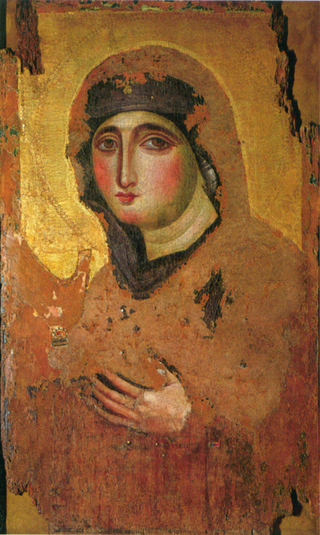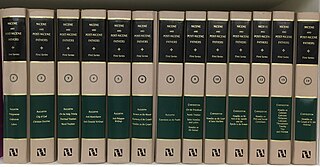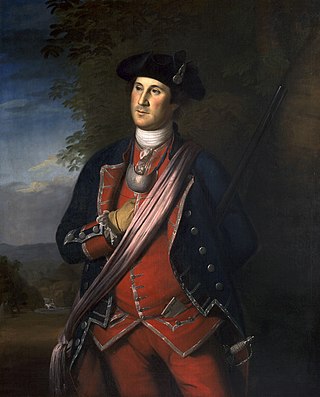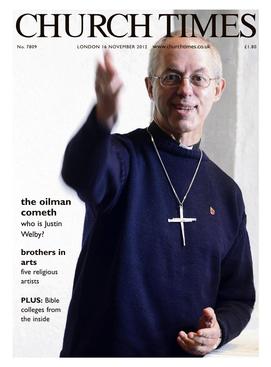Anglicanism is a Western Christian tradition which developed from the practices, liturgy, and identity of the Church of England following the English Reformation, in the context of the Protestant Reformation in Europe. It is one of the largest branches of Christianity, with around 110 million adherents worldwide as of 2001.

Revelation or Divine revelation is the disclosing of some form of truth or knowledge through communication with a deity (god) or other supernatural entity or entities, in the view of religion and theology.

In Christian belief, a saint is a person who is recognized as having an exceptional degree of holiness, likeness, or closeness to God. However, the use of the term saint depends on the context and denomination. In Anglican, Oriental Orthodox, and Lutheran doctrine, all of their faithful deceased in Heaven are considered to be saints, but a selected few are considered worthy of greater honor or emulation. Official ecclesiastical recognition, and veneration, is conferred on some denominational saints through the process of canonization in the Catholic Church or glorification in the Eastern Orthodox Church after their approval. In many Protestant denominations saint refers broadly to any holy Christian, without special recognition or selection.

Sola scriptura is a Christian theological doctrine held by most Protestant Christian denominations, in particular the Lutheran and Reformed traditions, that posits the Bible as the sole infallible source of authority for Christian faith and practice. The Catholic Church considers it heresy and generally the Orthodox churches consider it to be contrary to the phronema of the Church.

Anglo-Catholicism comprises beliefs and practices that emphasise the Catholic heritage and identity of the Church of England and various churches within Anglicanism. Anglo-Catholicism claims to restore liturgical and devotional expressions of church life that reflect the ancient practices of the early and medieval Church.

Mary was a first-century Jewish woman of Nazareth, the wife of Joseph and the mother of Jesus. She is an important figure of Christianity, venerated under various titles such as virgin or queen, many of them mentioned in the Litany of Loreto. The Eastern and Oriental Orthodox, Catholic, Anglican, Methodist, and Lutheran churches believe that Mary, as mother of Jesus, is the Mother of God. The Church of the East historically regarded her as Christotokos, a term still used in Assyrian Church of the East liturgy. Other Protestant views on Mary vary, with some holding her to have lesser status. She has the highest position in Islam among all women and is mentioned numerous times in the Quran, including in a chapter named after her. She is also revered in the Baháʼí Faith and the Druze Faith.

The Assumption of Mary is one of the four Marian dogmas of the Catholic Church. Pope Pius XII defined it on 1 November 1950 in his apostolic constitution Munificentissimus Deus as follows:
We pronounce, declare, and define it to be a divinely revealed dogma: that the Immaculate Mother of God, the ever-Virgin Mary, having completed the course of her earthly life, was assumed body and soul into heavenly glory.

Elizabeth Clare Prophet was an American spiritual leader, author, orator, and writer. In 1963 she married Mark L. Prophet, who had founded The Summit Lighthouse in 1958. Mark and Elizabeth had four children. Elizabeth, after her second husband's death on February 26, 1973, assumed control of The Summit Lighthouse.
Christian tradition is a collection of traditions consisting of practices or beliefs associated with Christianity. Many churches have traditional practices, such as particular patterns of worship or rites, that developed over time. Deviations from such patterns are sometimes considered unacceptable by followers, or are regarded as heretical. There are certain Christian traditions that are practiced throughout the liturgical year, such as praying a daily devotional during Advent, erecting a nativity scene during Christmastide, chalking the door on Epiphany Day, fasting during Lent, waving palms on Palm Sunday, eating easter eggs during Eastertide, and decorating the church in red on Pentecost.

Sacred tradition, also called holy tradition or apostolic tradition, is a theological term used in Christian theology. According to this theological position, sacred Tradition and Scripture form one deposit, so sacred Tradition is a foundation of the doctrinal and spiritual authority of Christianity and of the Bible. Thus, the Bible must be interpreted within the context of sacred Tradition and within the community of the denomination. The denominations that ascribe to this position are the Catholic, Eastern Orthodox, and Oriental Orthodox churches, and the Assyrian churches.
Lex orandi, lex credendi, sometimes expanded as Lex orandi, lex credendi, lex vivendi, is a motto in Christian tradition, which means that prayer and belief are integral to each other and that liturgy is not distinct from theology. It refers to the relationship between worship and belief. Its simplistic applicability as a self-standing principle independent of hope and charity was bluntly denied by Pope Pius XII, who positioned liturgy as providing theological evidence not authority.

The religious views of George Washington have long been debated. While some of the other Founding Fathers of the United States, such as Thomas Jefferson, Benjamin Franklin, and Patrick Henry, were noted for writing about religion, Washington rarely discussed his religious and philosophical views.
Theos is a Christian religion and society think tank researching the relationship between religion, politics and society in the contemporary world. Theos aims to impact opinion around issues of faith and belief in society through research, publications, media engagement, podcasts, animated videos, and events such as debates, seminars and lectures. Theos is headquartered in the United Kingdom in Westminster, London.

The Church Times is an independent Anglican weekly newspaper based in London and published in the United Kingdom on Fridays.
Christian views on environmentalism vary greatly amongst different Christians and Christian denominations.
Christian atheism is an ideology that embraces the teachings, narratives, symbols, practices, or communities associated with Christianity without accepting the literal existence of God. It often overlaps with nontheism and post-theism.

Justin Portal Welby is an Anglican bishop who served as the 105th archbishop of Canterbury in the Church of England from 2013 to 2025.

The Episcopal Church (TEC), officially the Protestant Episcopal Church in the United States of America (PECUSA), is a member of the worldwide Anglican Communion, based in the United States. It is a mainline Protestant denomination and is divided into nine provinces. The presiding bishop of the Episcopal Church is Sean W. Rowe.
Francis Spufford FRSL is an English author and teacher of writing whose career has shifted gradually from non-fiction to fiction. His first novel Golden Hill received critical acclaim and numerous prizes including the Costa Book Award for a first novel, the Desmond Elliott Prize and the Ondaatje Prize. In 2007 Spufford was elected a Fellow of the Royal Society of Literature.

Rachel Mann is a British Anglican priest, poet and feminist theologian. She is a trans woman who writes, speaks and broadcasts on a wide range of topics including gender, sexuality and religion. She has served as Archdeacon of Bolton and of Salford since 2023.












